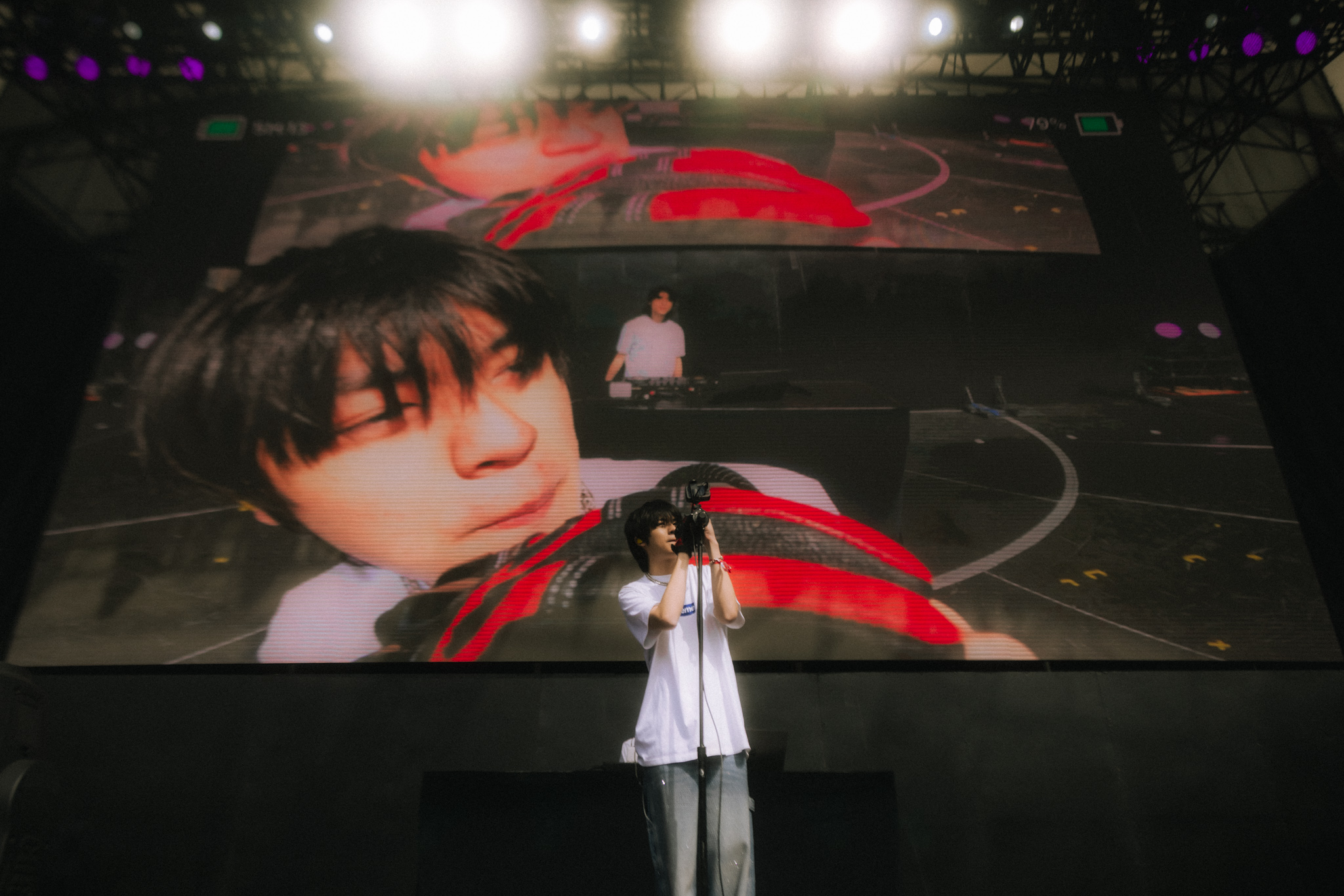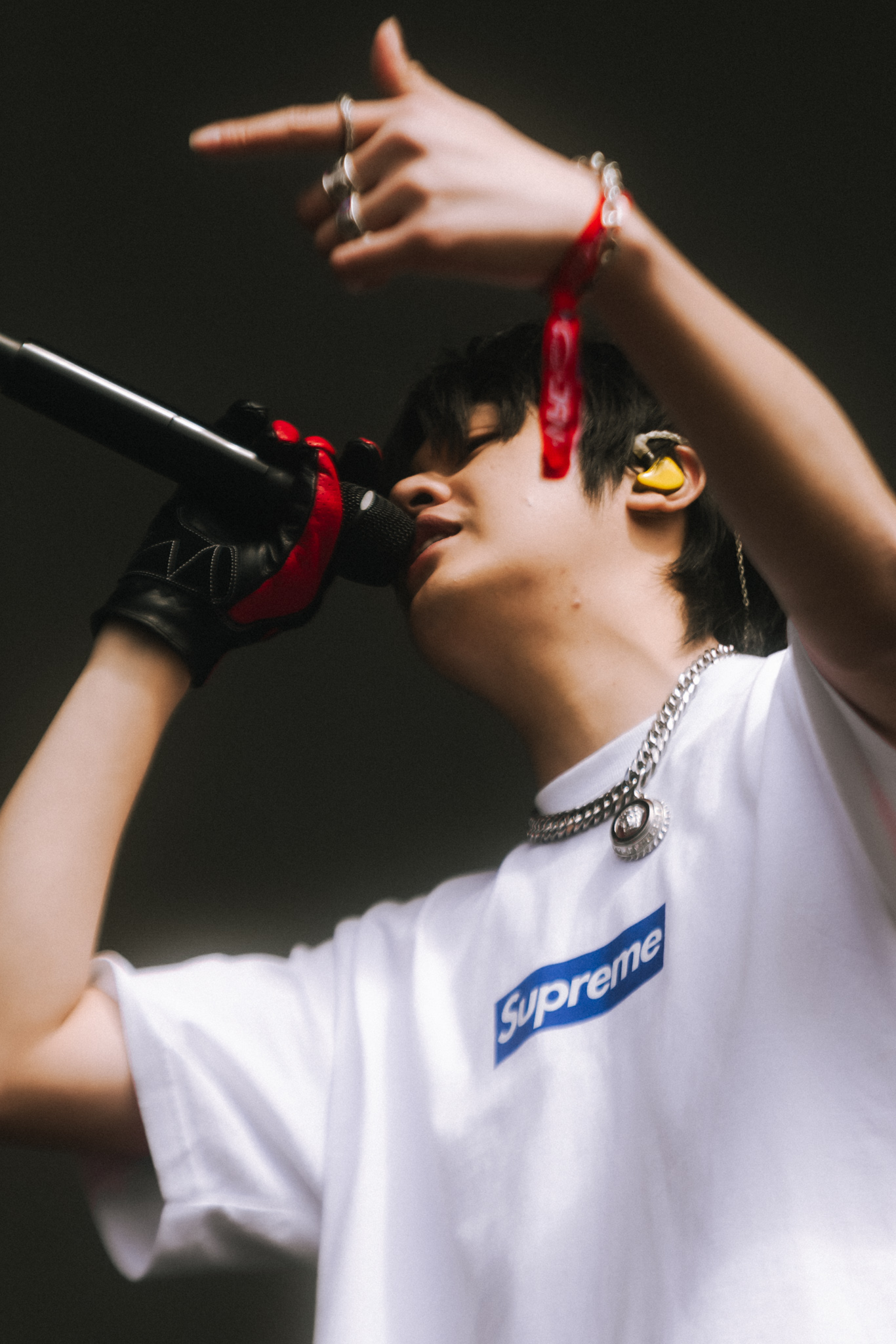Words / Jennalynn Fung
Photos / Esther Kim
At some point, it doesn’t matter what Warren Hue is saying on stage, because he has the crowd on lock. His presence is surprisingly formidable as he shouts into the microphone, voice bellowing into the greater amphitheater. Backstage, he’s relatively quiet and doesn’t draw attention to himself.
It’s obvious that this isn’t his first rodeo – he’s been a performer at 88rising’s Head in the Clouds (HITC) before, many times, and although his discography is bigger and his favorite color has gone from yellow to purple (reminiscent of his original artist name: “warrenisyellow”), very few components have changed. When it comes time for an interview, Hue is relaxed, reclined on the lawn chair.
His name has been on the lineup for HITC more than once. He performed here last year for HITC’s first expansion into the East Coast, and his 2024 return to Forest Hills Stadium is more or less a vacation to New York for him and his friends. He has no reason to be nervous, fully aware that people here are eager to hear him live. “It’s just always a wholesome energy all the time – New York’s one of my favorite cities,” he says coolly. “I’m just excited to perform new music and see my fans again. So it’s a good time.”
His easygoing demeanor in NYC might be due to more than just familiarity with 88rising; the Indonesian artist nearly attended art school in New York, influenced early on by his mother’s own fashion interests, and his father, a garment worker. Now, as an established singer, he still keeps an eye on new trends, stating that his current favorite trends are sports jerseys and mesh material, as well as the eclectic and bold designs by designer Martine Rose. Had it not been for music, Hue says his future would’ve still been arts related, like film or fashion.
However, what made Hue choose music over the other mediums was how easy and naturally it came to him. “I feel like fashion is a little harder sometimes, and film can be time-consuming,” he says.
As a teenager, Hue attended the British International School of Jakarta, and began making music for fun, enraptured by the limitless possibilities of sound. He started freestyling around 13 with his friends. One of his first music videos was filmed at school, for “Swimming Pool” ft. Erika Prihadi, which was the beginning of his local career. “Just me experimenting all the time when I was young – it worked out for me. I already garnered a decent following back in Jakarta; even though it was local, it was enough to motivate me to push harder. Gradually, I just enjoyed the art of just making music and how creative you can get with it. I’m just in love with storytelling in general and hip hop music, so just stuck with me over the years.”

Now, at 21 years old, he’s signed to 88rising and based in Los Angeles, forced to acknowledge the responsibilities that come with his music, such as providing for his family. It’s not just a hobby – it’s his job. “I don’t have as much fun as before, for sure. But it’s still music that I enjoy making.”
Whether his music has grown lyrically, though, is questionable. Hue’s involvement and consumption of hip hop music has always been at a distance – and that handicap is reflected in his early music. Most of his songs do not dwell on personal stories or hardships like the OG hip-hop does. Instead, they read as quick quips and impulsive rhymes, which makes sense when he reveals that in the studio, he tries to capture the first melodies that come to his head, and tries to “lay it down as soon as possible” because they feel the most natural.
Hue’s rhythmic skill is undeniable, with many freestyles available for view on YouTube. His potential as a rapper is immense, but his frequent reliance on referencing celebrities and luxury brands, as well as repetitive themes of self admiration and sexual exploits can feel mundane and disappointing.
For example, in “BOTYFREESTYLE#1,” lines like, “Her legs wide, it’s panoramic” and “Feel like Drizzy on Views / I got plenty of benjies” showcase his knack for catchy phrasing but also highlight a dependence on superficial content– though he’s far from the only rapper with these pitfalls.
He cites Tyler, the Creator and Mac Miller as some of his biggest rap inspirations, and you can see their influence, but Hue’s lyricism doesn’t come close to their depth. Instead, Hue’s work is more similar to Amine’s ONEPOINTFIVE, which had come under similar criticism by Pitchfork’s Sheldon Pearce, who wrote: “the songs on ONEPOINTFIVE aren’t rapped with the same joy … they are significantly less interesting, less curious, and less story driven. His swaggering is all bluster, no charm.” His words also resonate more strongly with his idol-turned-collaborator, Rich Brian, who relied on similar themes of flex-culture in his earlier work.
It’s not that Hue doesn’t take his lyrics seriously at all, though. Both Brian and Hue have been upfront about their caution towards rapping in Indonesian. While the artist has incorporated a handful of words into his songs on his first album, SUGARTOWN, he hasn’t committed fully due to his respect for the language, saying, “I don’t want to make it light or something, especially being not crazy-fluent in Indonesian.”

Although the lack of seriousness might be disconcerting at first glance, it means Hue has a lot of space to grow and improve, and he still has plenty of gravitas as a performer regardless of what he writes. While his first songs like “candychoppa” starts off with phrases like “Fuck a bad bitch, all I need is a full package,” his more recent work like “SPLIT” and “RODEO” provide more substantive storytelling.
In “SPLIT,” themes of nostalgia, yearning and personal struggle provide a refreshing glimpse into a more nuanced and reflective side of Hue. Sonically, “SPLIT” is one of his best tracks, with a criminally addictive beat that Hue believes you can “enjoy on a daily basis.” His singing voice is incredibly smooth in this song, too.
“Boy of the Year” probably most accurately characterizes Hue as an artist today, though. It mixes his typical bravado with moments of introspection; dominating the song are lines like “All my opps and my shawties know I’m handsome,” but the song includes hints of intimacy, with “All this ice, but I just want you to answer.” This contrast highlights Hue’s potential to blend his confident persona with genuine emotion, creating a more compelling narrative. Ironically, this introspection might be less evolution of Hue than it is a foil. Chasu, his long-time producer, is the one who sings the emotionally vulnerable chorus, bringing into question whether Hue even wrote it.
“RODEO” which comes out May 31st, 2024, though, is a step forward for Hue. Filled with themes of value and self-worth, the song is about uplifting and validating his partner beyond the superficial high of substances and luxury items. While he takes his love interest to Rodeo Drive and dresses her in Saint Laurent, he recognizes that these external symbols are not the true measure of her worth. It makes sense given the music video setting is Hue standing alone in a field of flowers.
The chorus, with its repeated query about enjoying the high “sometimes, not all the time,” suggests an awareness of the temporary nature of such highs and a deeper longing for a connection; the song’s introspective moments are about moving past superficial relationships, eliminating haters, and a desire for fostering supportive connections.
“RODEO” was engineered by Chasu and Joe Cho, but stands out sonically from the rest of his discography, weaving Hue’s voice into synthy-rock and keys, a combination that feels like a euphoric trill at times. Hue states that he is always on the lookout for new sounds, telling me, “I feel like if you just make the same old thing, it just feels too industrial. And that’s not my goal.” In the end, Hue is trying to create music that is new to him, making his studio less of an office job, and more of a playground for creativity.
Hue’s flow has always been high quality, but his ability to connect with listeners on a profound emotional level has been lacking. Crowd-work can only do so much for the hype, but the feeling audiences go home with is and always will be contingent on the emotion of his lyrics.
His latest tracks “RODEO” and “SPLIT” are for his upcoming mixtape, TUNA, which he describes as “cool vibes.” It’s not meant to be an album; “[It is] not doing too much – less conceptual. It’s just a collection of songs that I’ve made over the two years,” he says. But TUNA serves as a precursor to his next album, ARTHUR, which he says will “exist in the same sounds and be consistent.”
Hue’s growing ability to balance engaging, high-energy music with deeper emotional themes, reflects his potential as a true artist. His dynamic vocal delivery and seamless integration of varied beats are indicative of his strong musicality, but his maturing lyrics will enable him to achieve even more.
